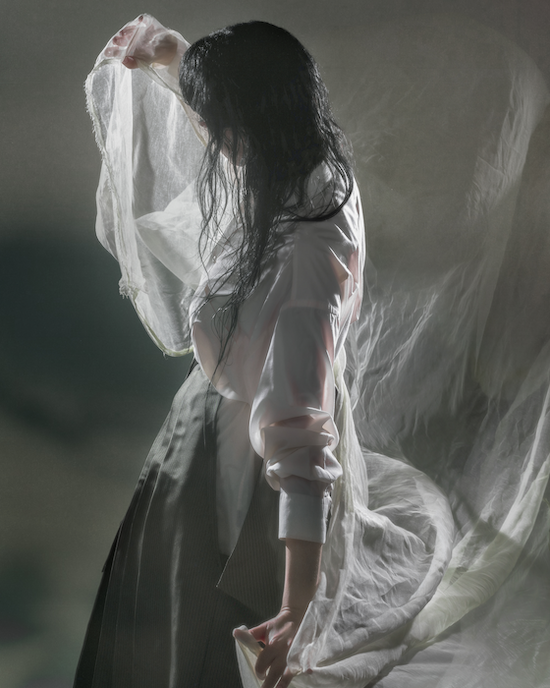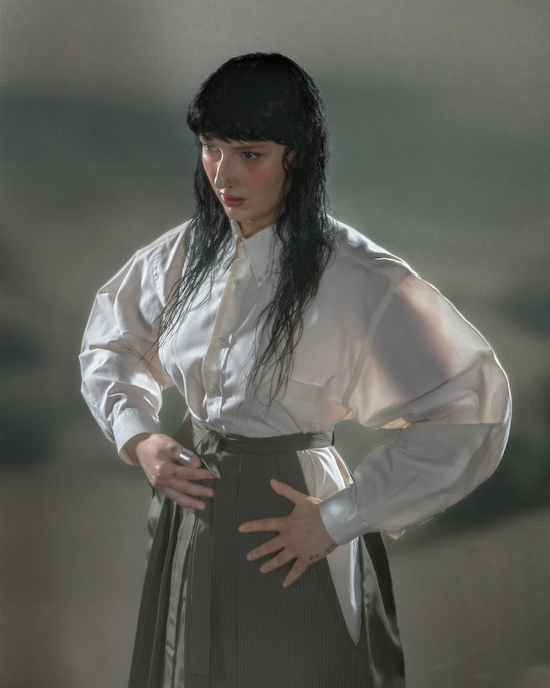Photos by Iryna Drahun and Igor Lorok
Though today it’s considered a cliché, mocked by figures as far back as Arthur Schopenhauer, a saying variously attributed to Goethe and Schiller springs to mind when listening to the debut album by Martyyna. “ Music is liquid architecture; architecture is frozen music.” An architect as well as the co-founder of the Illegal Taipei architechture research hub by day, and an artist by night, her personal relationship between the two art forms is a little less romantic.
“I think generally they share several fundamental values such as rhythm, energy, harmony, texture, proportion and dynamics,” she says. “They both have some impact on each other and they are part of our everyday lives, and a result of human creativity. My relationship with both is very tight and contentious at the same time.”
Developing an interest in production and DJing during her university years, “due to a lack of creativity and self-expression in my job, I started to become more interested in music creation. Architecture is very dependent on strict restrictions, laws, developers, clients and other factors. There’s little space for my creativity, and it’s often predetermined by a basic set of rules.”
Now a resident DJ at the Fuchs2 club in Prague and co-founder of another night called KSK, Martyyna has been an active figure on her local scene for years. It’s only recently that she got involved in electronic music production of her own, however, releasing her debut EP in 2020. “Initially I didn’t really have any skills and knowledge, and that gave me a feeling of absolute freedom,” she says. “Everything was driven mostly by coincidence and emotions. Finally, I could be the person giving orders.” She dipped her toes in production by first editing her own DJ mixes, and later doing remixes for the likes of jjjacob and Ethno Service. Her first solo tracks were released on local labels Unizone and BCAAsystem as well as Australia’s Eco Futurism Corporation, with a collaboration with revered Kenyan producer Slikback arriving early last year. Partly inspired by the “deconstructed club” aesthetic of labels like Shanghai’s SVBKVLT, her debut EP Awaken employed Chinese instruments such as the guzheng – a plucked zither – and the erhu, a two-stringed fiddle.
The crucial factor which led to the inception of her debut album, though, was the use of her vocals. “I’m interested in a variety of transformations of my own voice. Sometimes I’m creating soundscapes for other instrumental layers in the compositions, sometimes turning my vocals into an instrument for melodies and harmonies. I’m also deliberately playing with comprehensibility. In some tracks, I try to deliver a range of emotions by abstract form, while in some compositions lyrics are half-revealed, wrapped in echoes and soundscapes.”
As with contemporaries like Lyra Prymuk and aya, the grain of Martyyna’s voice is at the centre of her productions. “Playing with your vocals is a very self-knowing process. You can discover thousands of forms and positions even during the exploration of various vocal effects. But also in its natural form due to the effects of stress, fatigue or your own fear of how you sound.”
An important aspect of her creative process is also its healing effect. “For me, creating music has generally become like a therapeutic process. It’s very liberating, and enables me to express some hidden parts of me that I usually don’t bring out. I can dig inside my own fears and uncertainties, and this way I can sort my feelings.” While you might expect her to name-drop artists from the PAN or Hyperdub roster as her main influences, the reality is quite different. “I recently realised that the music I was listening to as a teenager somehow got stuck in my heart. Enigma, Enya, Orbital, Madonna, Kate Bush, and so on.” Enya-esque vibes indeed permeate the whole record, evoking a sense of yearning, hope and a desire for resolution.

Instead of an overarching conceptual frame, the record is built around certain keywords: ‘fragments of the past’, ‘coincidence’, ‘emotions’, ‘natural sounds’. Inspired by fragments of her previous EP, she took some older stems and sounds, and gradually melted them together to create something new. A guiding principle in this process was coincidence. “It’s my main drive. Although lately I’ve decided to finally start studying music theory, learn notes and to play a real instrument, the infinite possibilities and processes driven by intuition are still very exciting to me.”
The album also features Czech artist Oliver Torr and Basque-born Berlin-based producer Portento. “They’re both my friends, and I’m a fan of their music and vocals. They have completely different voices, which was very exciting for me to test. The idea of a collaboration with Portento was born after my birthday celebration at a karaoke party.” The closing two songs, ‘Sunshine Girls’ and ‘Invitation’, function as a denouement, the kick drums slowly disappearing and their voices finally finding peace in a soothing harmony with one another.
Martyyna is currently working on the debut of a new AV show for Lunchmeat Festival 2023, which will take place in Prague later this month. “I’m working on it with my close friend and member of the KSK collective Igor Lorok, who also did the album cover, music video and the whole art direction,” she says. The concept is based on the idea of an imagined landscape. With its colours, relief and general aesthetic, the environment generated at the EV show will refer to the as-yet-unreleased music video for her single ‘This Time’, which they shot in the Canary Islands. “The desolate, burned-out land served as an inspiration for the album’s visual identity and AV set.”
“My main goal when creating music is to deliver emotions,” she continues. “It’s also my biggest expectation from music as a listener. I rarely listen to music just to chill.” A dream-like sonic travelogue of inner landscapes, Written In The Scars is characterised by glacial soundscapes, harsh, intense sounds, deep reverberations and angelic vocals transfixed by high-frequency glitchy sounds of natural origin. “Spiders, cicadas, owls, birds or just classic field recordings like wind, raindrops and sea waves reaching the shores. This is probably coming from my endless desire to travel and relax. Meanwhile, I have to sit for hours in the studio.”
Written In The Scars is ultimately a personal affair, its title an ironic play on the deterministic credo that our destiny is written in the stars. “Just like a scar is a mark left on the skin where a wound hasn’t been healed completely, we sometimes carry unique memories and personal traumas that haven’t yet been healed, and can influence our future steps,” she concludes. “Those scars are a reminder of injury, but also a reminder of the healing process itself. The record is about overcoming and absorbing them, searching for peace and harmony.” Each of the nine presented tracks conjures a different atmosphere and presents a different story. “Like in games, movies or books, my compositions also have an intro, a main plot and a denouement. The feeling that something started, happened and ended inside a song is very important to me.”
Martyyna will debut her new AV show at Lunchmeat Festival, which takes place in Prague from 25 to 30 September. For tickets, details, and the full lineup, click here


